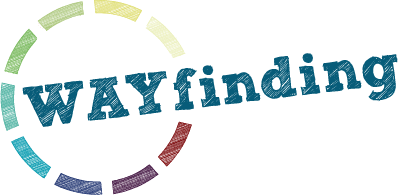WAYfinder Ashley Parsons says, "We so often ask our kids to do things we ourselves do not do." This is so true. Much more often, we need to "dive in" and do those things we're asking alongside our kids. Or, if we don't have kids, simply be "kid-like" and do them ourselves.
So, this week, I offer you a recent email I sent to our WAYkids' parents. The words and practices offered are not just for the kids among us; they're for all of us.
Hello! Summer is (nearly) upon us, and with it, an opportunity to slow down and connect - both lowercase “c” and uppercase “C.” Though WAYkids will largely be on break this summer, I want to take this opportunity to offer you a few ideas for continuing your family’s WAYkids’ journey.
Many of you participated in Sunday’s White Pines Wilderness Academy event. What a cool place! So much of what we heard and experienced had a spiritual component, so simply to add to that…
We began this year reading the book What Is God? by Etan Boritzer. The book begins, "What is God? You are asking a very, very big question!” So true. When I talk to kids about God, I like to acknowledge this fact: “What is God is such a big question that all people - both living today and those who lived long ago - have tried to answer this question and come up with lots of different answers.” I continue by explaining, “I too am trying to answer this question for myself. And, you can answer this question for yourself too. But, you’ll have to be very curious and open, explore, investigate and ask loads of questions. You’ll need to ask ‘What is God?’ in big spaces, like crowds and the whole forest. And, you’ll need to get very small and ask “What is God?” between just two people in the crowd - like you and your mom/dad - and the tiny ant marching along the forest floor. Because God is in all of it."
Because of this, I think nature is a natural and beautiful space for kids to experience and wonder about God. Many of us probably feel this way as adults too. I know I do. So, I want to offer a nature practice and meditation for your summer wanderings…
1. Sensory Nature Walk: Dr. Mark Germine said, "Our ability to cognitively abstract our contact with the world constantly takes our sensory experience and hides it under a veil of thought. The resulting loss of connection is, I think, the greatest ill that plagues humankind. It is the cause of many problems in the individual and in society.” The kind of slow and intentional presence a sensory nature walk requires of us helps us get out of our heads so we can experience and c/Connect directly. Our kids are usually naturally better at this than we are, but we still need to nurture this c/Connection. Use the attached Sensory Nature Scavenger Hunt with your kids to c/Connect this summer.
2. First and foremost, it’s important to just Be in the above experience with yourself and your kids. That is enough. But, if it intuitively feels right, you may want to ask your child(ren) at various points in your walk, “If this moment right now is God or tells us about God, what is God do you think? What does God feel like to you?”
3. Adapted from What Is God? by Etan Boritzer
"What Is g/God?" Meditation
If you want feel g/God, close your eyes, and listen to your breath go slowly in and out. Think how you are connected to everything, even if you are not touching everything.
Try to feel how you are connected to your Mom or Dad. Try to feel how you are part of your whole family, like your brother or sister, your grandparents, your aunts and uncles, cousins, even your friends.
And try to feel how all of those people are part of a whole bigger family. And how all the families of the world (even those we can't see or touch) are really a part of you and your family.
Now try and feel how all the families of the world include more than just human families: there are animal families and plant families, this forest is a family. We call this kind of family an ecosystem. Try and feel how these families are really a part of you and your family too.
If you can start to feel g/God like that, then maybe you will soon feel the whole answer to that very, very big question that everyone asks, "What is God?"
Take a deep breath in and out and slowly open your eyes.
I hope these practices prove to be c/Connective for you and your child(ren) this summer! Stay tuned for a service opportunity at some point as well. And, thank you for participating in another year of WAYkids!
Thank you!,
Anne





















